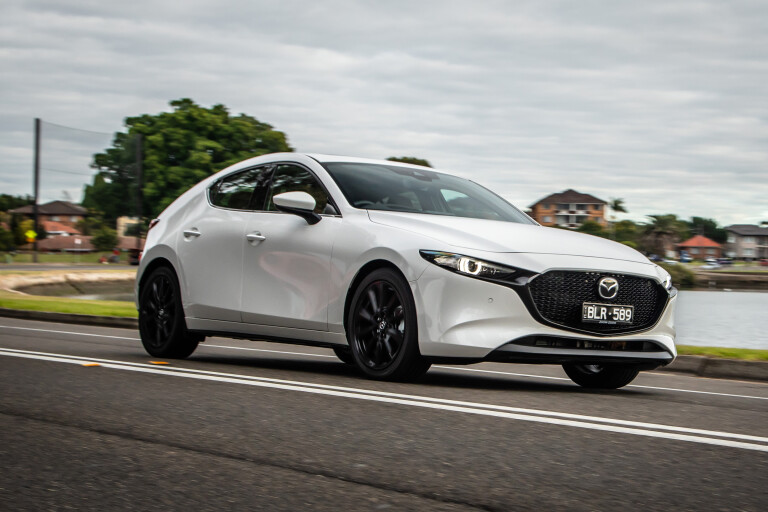
Score breakdown
Things we like
- Stylish exterior
- Richly upmarket interior
- Broad features set
Not so much
- Pricey
- Lack of turbocharging
- Overly firm ride quality
The Mazda 3’s smarter, slicker and more upmarket fourth generation certainly caused a stir once it arrived 2019, if perhaps not entirely in line with its importer’s hopes. Settling into showrooms, its favour with Aussie buyers slipped from what formerly was long-standing and solid footing. Australia’s particularly warm embrace of Mazda over two decades was, by the Japanese maker’s admission in the past, a bit of a head-scratcher.
And one imagines the small-stature spearhead of the brand’s more stylised, increasingly premium push not resonating as hoped with devotees Down Under caused just as many furrowed brows.
What’s not to love? Mazda 3’s sharper styling inside and out, dipped in ‘semi premium’ gloss, shouldn’t really deter. Indeed, with no luxury brand to protect, mainstream Mazda’s no-holds-barred design ethos has, for some time, afforded nothing but favour and it runs more liberally in its small cars than anywhere else in the stable.
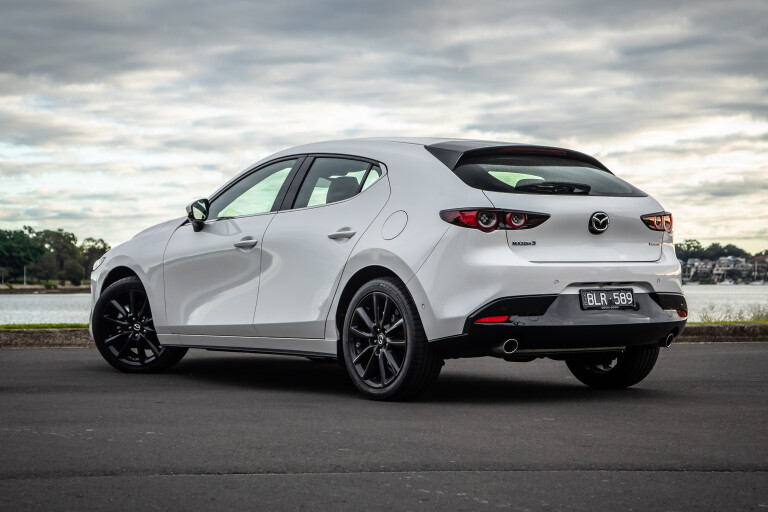
There’s no lack of variety for buyers: five grades (plus 100th Anniversary specials), two petrol engines and one hybrid, manual or automatic choices abound, and four- or five-door forms.
Surely the main culprit was pricing. Suddenly, Mazda 3’s tip-in was five grand higher in base form. And the high-grade G25 Astina hatch auto here on test, now at $38,790 before on-road costs, sits at the upper fringes of the categorically small mainstream. There’s fair argument presentation and equipment levels justify richer repositioning in metal, glass and rubber, if perhaps not quite so much in buyer perception.
The G25 Astina is nice. Very nice. But when ‘nice’ is your main selling point for a small hatch nudging 40 large, you’re facing an identity problem. It’s not turbocharged, fits a torsion beam rear end, and offers little fast- or even warm-hatch schtick or branding. It’s not nailing its intent to any solid mast. Instead, it’s Kodo-infused Zoom Zoom chockfull of SkyActiv, and one wonders if that’s enough to hang your hat off when shifting from a largely value-laden position to one asking increasingly serious dough.
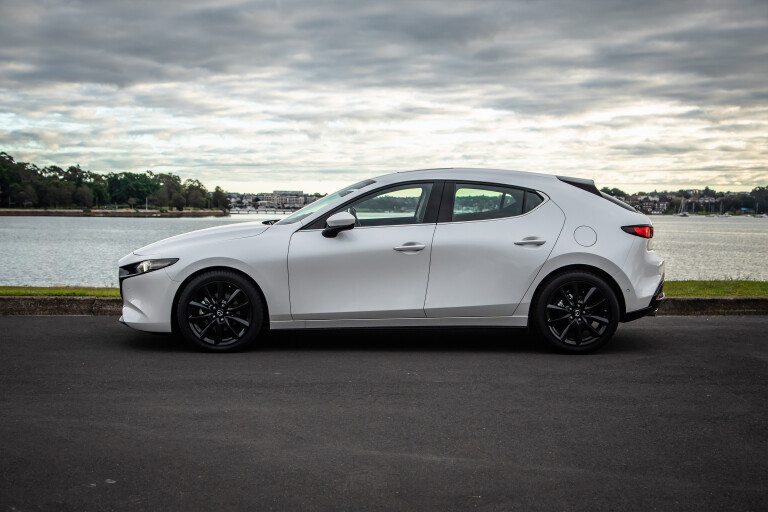
Today, it plays against the new eighth-generation Volkswagen Golf R-Line auto ($37,450 list) and a fresh-faced Kia Cerato GT Turbo Hatch auto ($35,290 list), both more affordable and with more distinctive pitches, as well as the ever-popular and more seductively priced Toyota Corolla ZR petrol ($32,695 list) and ZR Hybrid ($34,695 list) twins, and where a top-spec Subaru Impreza 2.0i-S wants for just $31,490 list.
There’s no SP or MazdaSpeed upgrades, no method to quicken or sharpen. But you can dress your Astina up, $1682 for alternative silver or satin chrome wheel designs, the latter rim set also offered in a Kuroi Sport styling pack that, at $4884, adds lower extension spoilers front, rear and side plus a roof spoiler and black mirror caps. Nicer, then.
Unsurprisingly, standard equipment leaves little for the options list, its striking if not quite pretty form incorporating niceties such as adaptive LED headlights, a sliding and tilting sunroof plus a 360-degree camera system with multi-angle viewing including dedicated forward and reverse perspectives.
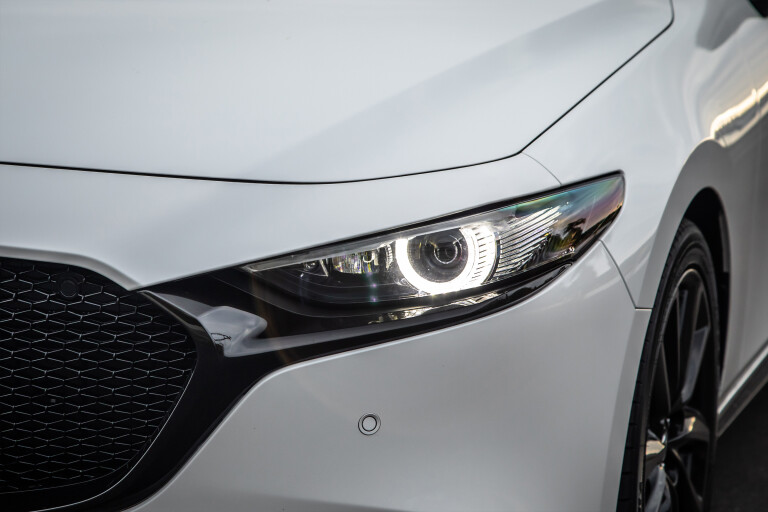
Primarily, though, the Mazda 3 is out for maximum exterior impact, ours with an inescapable Imperial Stormtrooper spin, its Snowflake White Pearl Mica paintwork, one of five metallic and mica finishes, at no extra cost. Three effects paints, including the well-flogged Soul Red, want for $495.
But it’s really cabin ambience that elevates the Mazda 3 above most competitors. Minimalist and contemporary without gauche fussiness, ours minted in no-cost optional burgundy trim that lifts the design better than the conservative black alternative. It’s a functional space, ergonomically resolved and intuitive, the controls uncluttered and falling neatly to hand in its fetching sport-luxury theme.
Primarily, though, the Mazda 3 is out for maximum exterior impact, ours with an inescapable Imperial Stormtrooper spin.
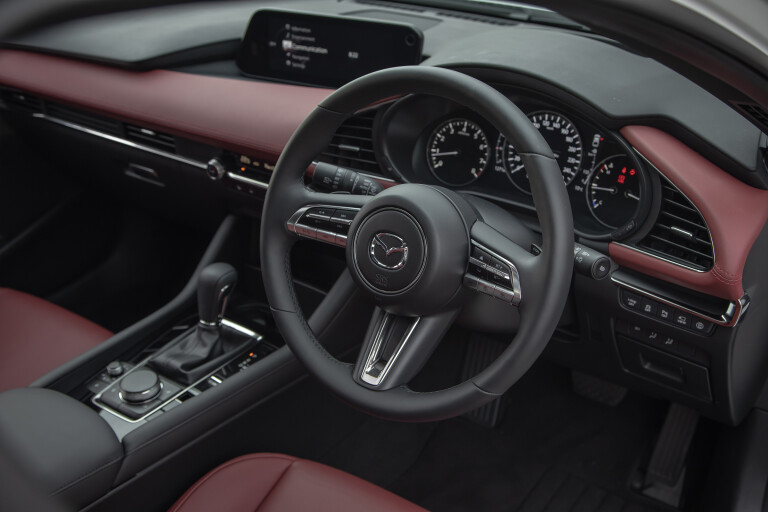
Anchoring the interior is the effect of the leather and leatherette, the seat surfacing more sumptuous than hardier stuff used by rivals, the neat two-tone dash fascia fetching with its neat double stitching.
From the slick slightly oversized wheel to the ornate door trim there’s not so much as a whiff of cost-consciousness, even if the analogue cluster – with its digital central roundel – might seem a bit humdrum in the current shift towards bedazzling fully digital jewellery.
This new direction is still such a lunge forward for Mazda that it still makes other stablemates’ design seem cheap and dowdy.
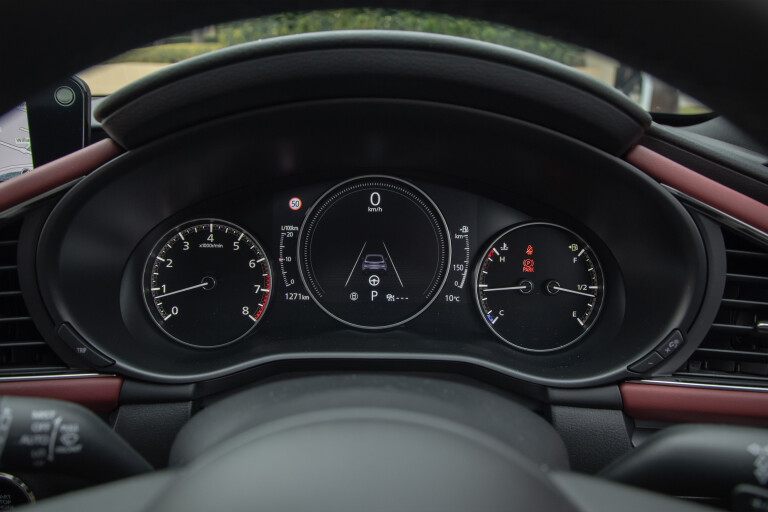
The front seats are cosseting and supportive, the driving position suitably driver-focused, and it feels as rich as it is welcoming. All is well up front. The smart presentation extends through to the second row, which does suffer a little from claustrophobia caused by merely modest legroom and a sweeping window line that saps outward visibility and is only really beneficial to exterior appearance.
Infotainment is the main bugbear, specifically smartphone mirroring. There’s no touchscreen control – it’s simply an 8.8-inch display – and navigating Apple CarPlay apps exclusively via the console’s rotary dial and button array is utterly tedious and distracting. Simply adding a touchscreen interface, as found on other Mazda ranges, is no quick fix as the Japanese maker presents a lock-out mode when mobile, an apparent safety initiative that in effect is contrary to its intent.
Like the cabin, the fully carpeted boot space presents well, though its 295-litre volume is modest to say the least. Dropping the 60:40 rear split-folding seatbacks liberates just enough room for a pushbike.
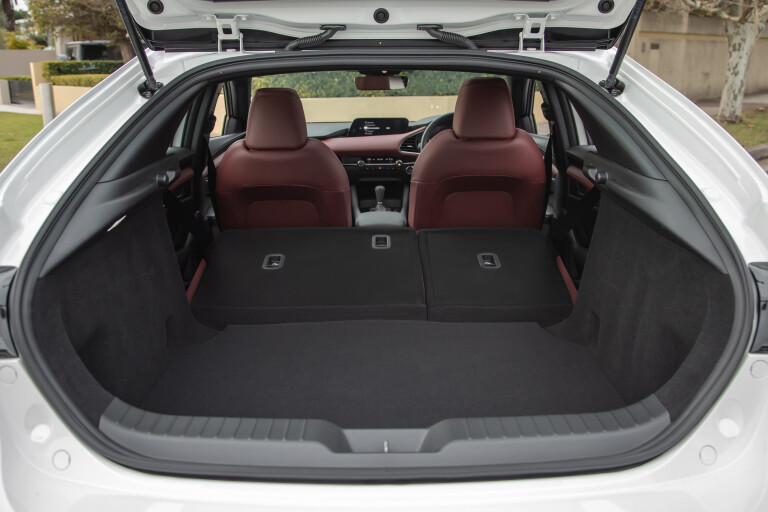
The lack of a turbocharged option will remain Mazda 3’s cross to bear whether it warrants it or not – again, perception counts for a lot – and the high-compression (13:1) 2.5-litre four plies a reasonably healthy 139kW at 6000rpm and 252Nm if, in typical naturally aspirated fashion, up at 4000rpm where you need to go searching for it.
A conventional six-speed automatic, rather than a CVT, or a six-cog manual is your choice in Astina, our self-shifter returning eight-litre consumption on test against its combined-cycle 6.6L/100km claim, and happily so on regular 91RON.
There’s energy enough to overcome the Astina’s 1380kg mass with ample haste, but the alert response isn’t followed through with quite enough mid-range shove, at least not without a lot of right foot encouragement, and then it yields a strained bark in response. Character isn’t this powertrain’s strong suit: it’s neither torquey enough for refined luxo-dignity nor charismatic enough to seem sporty, instead languishing about an uncommitted, if somewhat effective, middle ground.
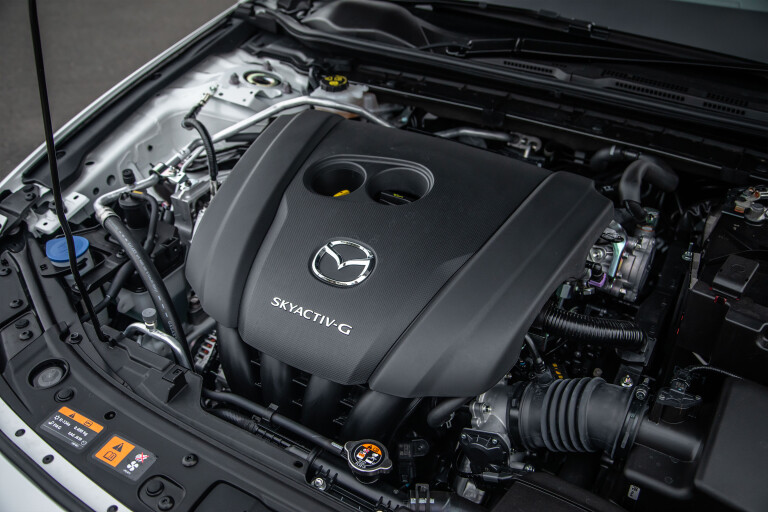
Eschewing the dreaded CVT in favour of a proper six-speed does, though, avoid constantly pegging the engine’s raspy mid-range and it’s a harmonious enough powertrain marriage, save from a faint if annoying vibration when at standstill left in D-for-drive.
Sport mode ups enthusiasm in noise and rpm if without the corresponding kick up the tailpipes. But it does march on, somewhat strained, to the point where its 215mm Toyo Proxes are sent scrabbling, without torque steer and with just a quick flicker-flash of traction control light in the instrumentation.
There are shades of resolved sportiness about its manner, its oversized wheel providing clarity and directional accuracy if stilted a touch in Sport mode by under-assistance, leaving it a little too hefty.
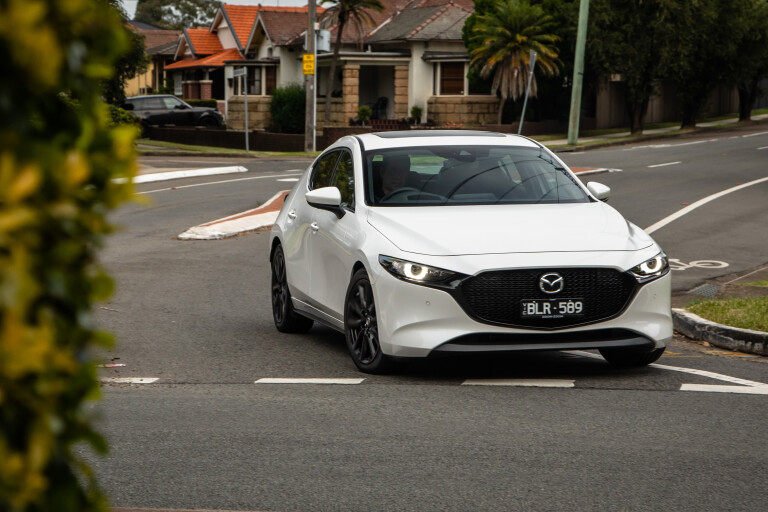
The passively damped suspension, with its torsion beam rear design, drags down on-paper credentials, questioning whether a hatch asking Astina money deserves more sophistication. But the tune delivers well in chassis confidence and dynamic eagerness even if it’s not the most reactive and lithe character once you push on. A high degree of competency, if somewhat short of the sort of fun factor that encourages you to push on and explore the limitations of its modest rubber.
Where it falls short noticeably is ride comfort. It’s fidgety across high-frequency bumps, overly sharp with deeper low-frequency road imperfections, and there is too much suspension noise accompanying its generally unsettled feel. Surely its taut nature intends to inject a bit of sporty fizz into progress but without the hot hatch pretension or promise a ride this hard is really unnecessary. Further still, it negatively impacts the ‘nice luxury’ hatchback vibe the Astina seems to position itself as.
That aside, this generation is a clear improvement in dealing with noise, vibration and harshness minimisation and, ride aside, there’s ample upmarket depth and quality about the driving experience. It’s certainly more well-rounded than some of its competition if, in sheer comfort terms, not close enough to threaten class leadership.
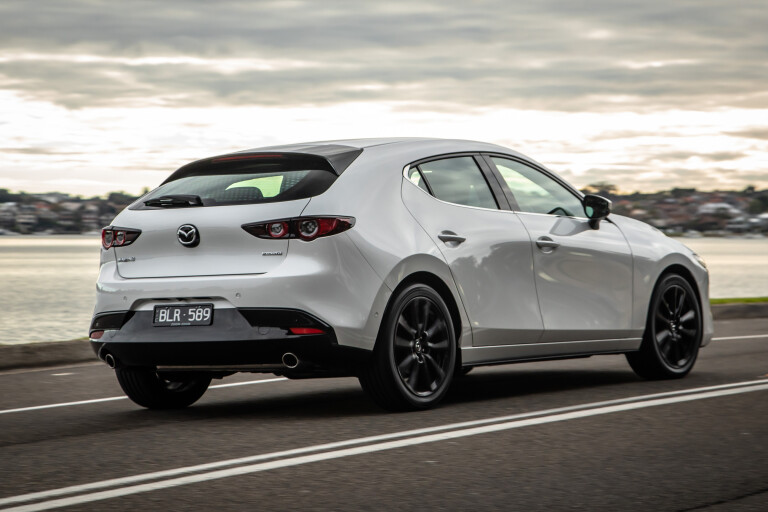
Where it does steal the march, though, is in safety fit-out. The Astina fits both forward and reversing AEB as well as front and rear cross-traffic alert systems along with neat features such as forward obstruction warning to compliment other functions like as lane-keeping assistance that are increasingly common in its competitive set.
Its five-star ANCAP-rated credentials also include a seven airbag complement and traffic sign recognition that, like most current commercialised designs, is inconsistent in its real-world accuracy and best treated as cursory advice.
It comes with a solid five years of unlimited-kilometre warranty and service intervals are 12 months but capped at a slim 10,000km, while servicing averages out to $340 per visit across the first five years, which is neither thrifty nor excessive.
This generation is a clear improvement in dealing with NVH minimisation and, ride aside, there’s ample upmarket depth and quality about the driving experience.
VERDICT
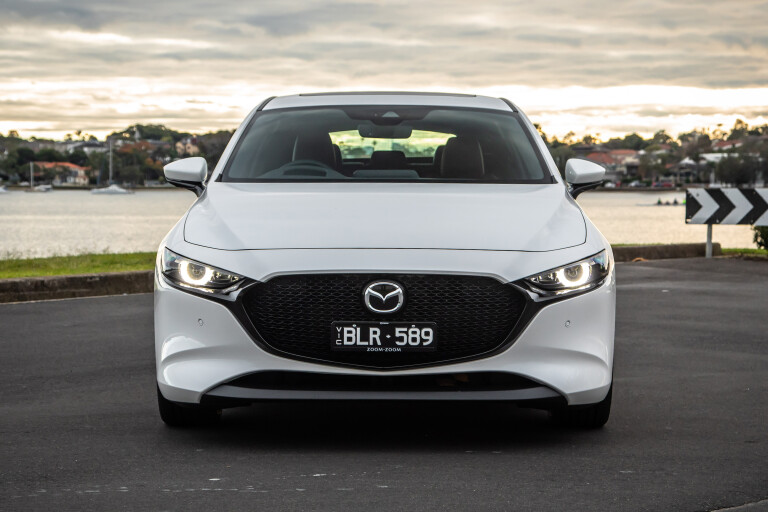
Style and presentation have long been Mazda strong suits and the Astina hatch is certainly a prized example. But it also backs this up with levels of execution and features – especially safety – that go a fair way to justifying its rich ask.
Working against it, however, is that lack of certifiable identity – its not overly luxury nor confidently sporting in intent – that mightn’t seem such an anchor had it bolstered its trick bag with turbocharging and higher levels of chassis sophistication. There’s not really that much in the experience to surprise and delight, to light a genuine fire under enthusiasm for it.
The Mazda 3 Astina is most certainly nice. It’s just not all that remarkable beyond merely ‘nice’, which surely must weigh in with its level of popularity, at least here in the high and pricey end of its range.
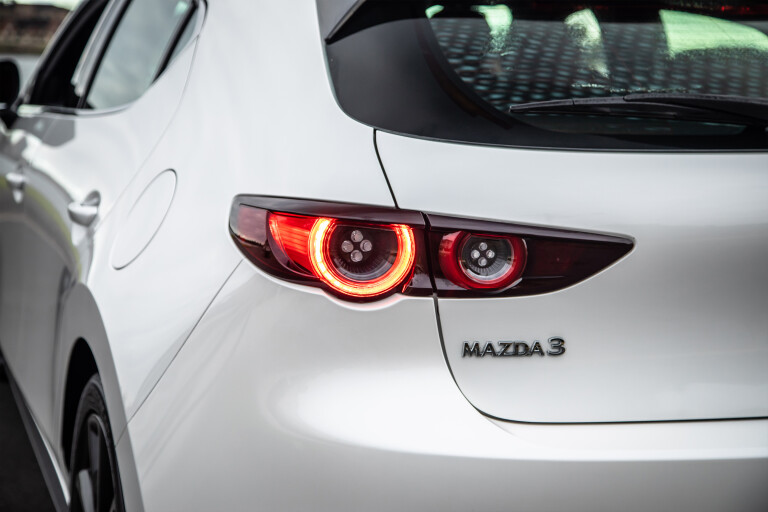
2021 Mazda 3 Astina Hatch specifications
| Body | 5-door, 5-seat hatchback |
|---|---|
| Drive | front-wheel |
| Engine | 2488cc inline four, DOHC, 16v |
| Bore/stroke | 89.0 x 100.0mm |
| Compression | 13.0:1 |
| Power | 139kW @ 6000rpm |
| Torque | 252Nm @ 4000rpm |
| 0-100km/h | N/A |
| Fuel consumption | 6.6L/100km (combined/claimed) |
| Weight | 1380kg (kerb) |
| Power/weight | 101kW/tonne |
| Transmission | six-speed torque converter automatic |
| Suspension | struts, springs, dampers, anti-roll bar (f); torsion beam, springs, dampers, anti-roll bar (r) |
| L/W/H | 4460/1795/1435mm |
| Wheelbase | 2725mm |
| Tracks | 1570/1580mm |
| Steering | electrically assisted rack-and-pinion |
| Brakes | 295mm ventilated discs, single-piston calipers (r); 265mm solid discs, single-piston calipers (r) |
| Wheels | 18 x 7.0-inch (f&r) |
| Tyres | 215/45 R18 (f&r) Toyo Proxes R51a |
| Price | $38,790 |
Score breakdown
Things we like
- Stylish exterior
- Richly upmarket interior
- Broad features set
Not so much
- Pricey
- Lack of turbocharging
- Overly firm ride quality

COMMENTS